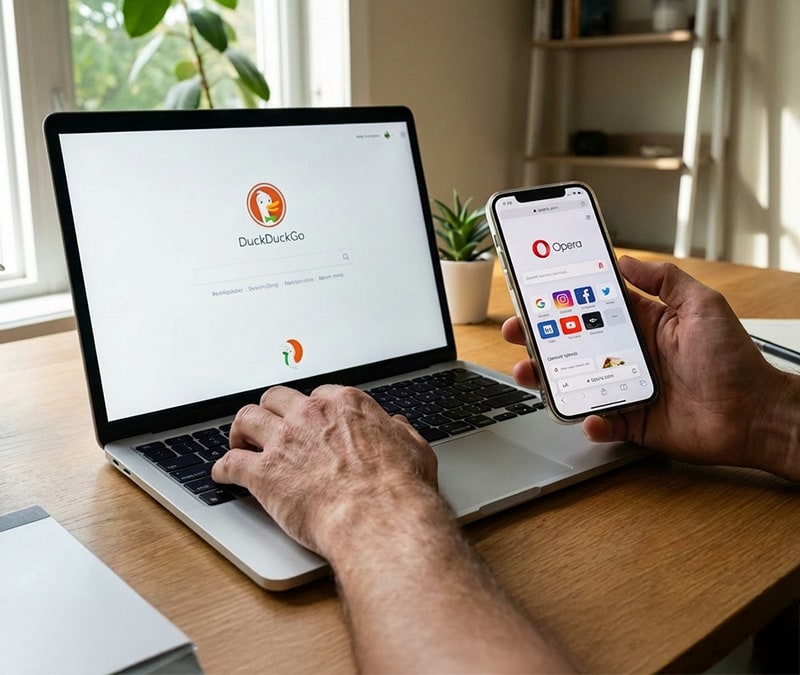Don't Feed the Bots: What Not to Share with AI Chatbots
When using AI chatbots, it’s important to understand the risks of sharing personal information. Even casual conversations can unintentionally reveal more than intended. Protecting your data starts with knowing what not to share with AI chatbots.

AI chatbots are revolutionizing the way we work, learn, and communicate. But while these bots can assist with everything from drafting emails to explaining quantum physics, they’re not as private as you might think.
Sharing information with AI chatbots is a lot like having a conversation in a crowded coffee shop. While the exchange feels casual and helpful, you wouldn’t start loudly discussing your bank account details or disclosing deeply personal secrets, right?
What the experts say
"Your data powers the system, but... once you provide your data, it is no longer truly yours. It can be used to train future models, shared with business partners or even leveraged in a corporate acquisition." - Gen Blog, 2025
Michalis Pachilakis, Principal Research Engineer
Much like in that busy coffee shop, when engaging with chatbots, it’s important to treat every interaction with care and awareness. Sharing the wrong information can have serious digital consequences, from identity theft to data misuse. Having a cautious mindset is key to protecting your privacy—and it brings us to the next point: what not to share with chatbots.
Here’s your guide on what not to type into that text box.
1. Personal Data
Hopefully, this one’s a no-brainer, but it’s also an easy mistake to make. Sharing your personal information with an AI chatbot might seem harmless, but it’s like posting it on a bulletin board for anyone to see. Why? Many bots store and analyze your input to learn and improve their responses.
Examples of risky personal data include:
- Your full name
- Phone number or home address
- Date of birth
- Social Security number (seriously, don’t)
- Driver’s license or passport numbers
Why it’s risky: Sharing personal information with a chatbot can have serious consequences. If malicious actors gain access to the chatbot’s database, they could use that data for identity theft, stalking, or profiling. Even seemingly harmless details can be pieced together to exploit or manipulate you.
2. Financial Details
Typing credit card numbers or bank information into a chatbot? That’s like handing your wallet to a stranger and hoping for the best. The risks are real—financial loss, identity theft, unauthorized transactions, and even falling victim to fraudulent activities or investment scams.
Examples of financial details include:
- Credit or debit card numbers
- Bank account details
- Account passwords
- Tax information
Why it’s risky: Sharing financial details can lead to unauthorized transactions, identity theft, fraudulent activity, or scams. These risks can result in financial loss, damage to your credit, or even long-term financial issues if the information is misused.
3. Usernames and Passwords
We get it—managing countless passwords is frustrating, and quick fixes can be tempting. But sharing your login credentials with a chatbot is never safe; these tools aren’t designed to securely store sensitive information, and doing so can open the door to serious threats like hacking or phishing scams. Once hackers get access to your login details, they can infiltrate your accounts, leading to identity theft, data breaches, or even financial loss.
Examples of credentials include:
- Social media login details
- Online banking credentials
- Email passwords
Why it’s risky: Any sensitive information shared with a chatbot could end up in the wrong hands, intentionally or unintentionally. This is exactly how phishing scams succeed—by exploiting trust or convenience to steal personal information.
4. Sensitive Company Information
Sharing business secrets with an AI chatbot? It’s easier to do than you think. Whether you’re drafting an email, working on a project, or debugging code, it’s tempting to rely on AI tools for help. But remember, these tools store user inputs, meaning your proprietary data might not be as private as you think.
Examples of sensitive company information include:
- Trade secrets
- Customer data
- Financial reports
- Product development details
Why it’s risky: Leaks of company information could lead to legal issues, such as breaches of confidentiality agreements or data protection laws, a loss of competitive advantage by exposing trade secrets to competitors, or severe damage to reputation that erodes customer trust and impacts future business opportunities.
5. Medical Information
AI chatbots aren’t medical professionals, so it’s not advisable to share your medical history or health concerns with them. While some chatbots are specifically built for healthcare and follow strict regulations, most general-use bots aren’t bound by privacy laws like HIPAA, meaning your sensitive information could be stored, shared, or exposed without proper safeguards. Relying on them for medical advice or storing personal health data can put your privacy at risk.
Private health data examples include:
- Diagnoses or treatment plans
- Medication lists
- Allergies or health conditions
- Family medical history
Why it’s risky: This data could be used for discrimination, privacy infringements, or even This kind of data could be misused in several harmful ways, including discrimination based on your health status or personal background. It also opens the door to serious privacy violations, where your sensitive information is accessed or shared without your consent. In some cases, it could even be exploited in health-related scams, such as fraudulent treatments or phishing schemes targeting your vulnerabilities.
6. Creative Works and Intellectual Property
Sharing your budding screenplay or groundbreaking business idea might seem harmless, but it could backfire. AI bots are designed to analyze and learn from the data they're given, and anything you share could end up being used in ways you didn’t intend. This could lead to ideas being replicated, shared, or even incorporated into other projects without your knowledge.
Examples of creative works include:
- Written works, like scripts or essays
- Artwork, designs, or photographs
- Patented inventions
- Business ideas
Why it’s risky: There’s a chance your intellectual property could be copied or reused without your permission. This could result in serious copyright violations or even a complete loss of ownership over your work, leaving you vulnerable to legal and financial risks.
7. Private Thoughts or Intimate Feelings
AI chatbots can feel like safe spaces to share thoughts and emotions, but emotional vulnerability comes with potential risks. These bots aren't truly empathetic, and sharing deeply personal information could lead to privacy concerns if the data is stored, analyzed, or misused. It's important to stay mindful of what you disclose and remember that, at the end of the day, you're talking to a machine—not a trusted confidant.
Examples include:
- Emotional struggles or mental health concerns
- Personal relationships or family issues
- Embarrassing experiences
Why it’s risky: Privacy breaches can expose sensitive personal information, leaving individuals vulnerable to discrimination or harassment. In more severe cases, this exposure could lead to stalking, putting personal safety at serious risk.
8. Illegal Activities
It should go without saying, but just in case—never share or seek advice on illegal activities with AI chatbots. Engaging in such behavior is not only unethical but also carries significant risks. AI systems are programmed to detect and flag inappropriate or unlawful content, and any information you share could potentially be logged and reviewed. This means your actions could have serious consequences, including legal repercussions.
Beyond that, using AI in such a way undermines its intended purpose of providing helpful, constructive, and ethical assistance. Always use AI responsibly and within the bounds of the law.
Examples of illegal activities include:
- Drug use or distribution
- Cybercrime plans
- Fraudulent activities
- Violent threats
Why it’s risky: Sharing illegal activity can lead to serious legal consequences, such as fines, criminal charges, and imprisonment, as well as permanent damage to your reputation. Social media platforms may also suspend or ban your accounts for policy violations.
How to Use AI Chatbots Safely
To get the most out of AI chatbots without compromising your security, follow these tips:
- Be mindful of the information you share. Assume everything you type is stored.
- Read the chatbot’s privacy policy to understand how your data will be used.
- Adjust privacy settings to protect sensitive information.
- Opt-out of data sharing wherever possible.
AI chatbots are an incredible tool—they can simplify tasks, provide entertainment, and answer complex questions. But it’s up to you to protect your data. Before you hit “send,” think about what you’re sharing and whether it’s worth the risk.
Want to stay secure in an increasingly digital world? Discover how Norton 360 can help safeguard your data and protect your privacy.
Editorial note: Our articles provide educational information for you. Our offerings may not cover or protect against every type of crime, fraud, or threat we write about. Our goal is to increase awareness about Cyber Safety. Please review complete Terms during enrollment or setup. Remember that no one can prevent all identity theft or cybercrime, and that LifeLock does not monitor all transactions at all businesses. The Norton and LifeLock brands are part of Gen Digital Inc.







Want more?
Follow us for all the latest news, tips, and updates.